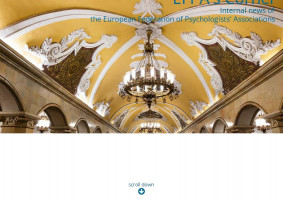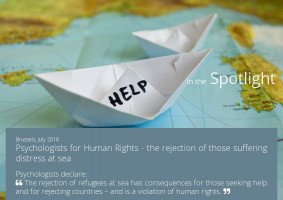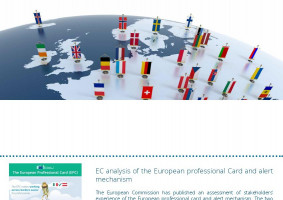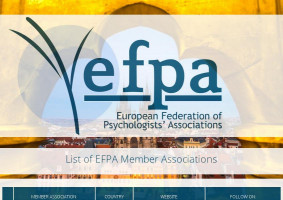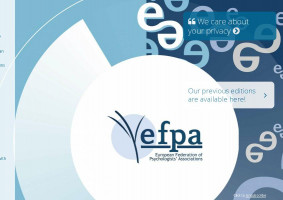Brussels, July 2018
Psychologists for Human Rights - the rejection of those suffering distress at sea
Psychologists declare:
The rejection of refugees at sea has consequences for those seeking help and for rejecting countries – and is a violation of human rights.
In June 2018 two ships hired by non-governmental organizations rescued more than 800 refugees from been drowned in the Mediterranean Sea. Although harbours in Italy and in Malta were the closest to land for the refugees, the governments in both states denied landing of the ships and giving shelter to the refugees. Since then, the treatment of refugees in this way has been repeated and seems to have become routine.
According to Prof. Ulrich Wagner from EFPA Board Human Rights and Psychology:
As professional psychologists, we declare that the incidents in the Mediterranean Sea will have serious consequences not only for those directly suffering, the refugees. Psychological research shows that violations of the need for bodily integrity have severe consequences for those affected in the form of posttraumatic disease, depression, suicide and heightened level of aggression against others.
The brutal rejection of refugees in distress at sea will also have consequences for the responsible European states and Europe in general. European citizens will ask themselves how to justify such a dramatic violation of Human Rights and European values.
Psychological research delivers extensive evidence showing that in such situations of threats to fundamental values, human beings tend to blame the suffering people themselves for the hurt and injustice they have experienced. In this way the unbelievable seemingly makes sense. The consequence is that those suffering, in this case the migrant people, are devalued and dehumanised, leading to the revival of racist and extremist ideas.
The rejection of refugees in distress from landing has not only major consequences for those being directly affected, the refugees, and the European states and their political and social climate, we believe it is also a flagrant violation of human rights: Article 3 of the 1948 United Nation’s General Declaration of Human Rights declares the right to life as fundamental for any human being.
Wagner urges: “As professional psychologists, we ask everyone, including those who are politically responsible, to find a way back to a position in accordance with humanity and human rights. This may even promote peace within Europe and to work against increasing conflicts within Europe.”
Press report and related articles on the EFPA website

European aviation psychologists in support of aircrew and airlines
New rules on mental fitness of air crew after the Germanwings Flight 9525 incident in March 2015:
European airlines will perform a psychological assessment of their pilots before the start of employment.
On July 25, 2018 the European Union published new safety rules on air operations, including new provisions to better support the mental fitness of air crew. The Regulation includes the following safety measures:
Support programme: all pilots working for European airlines will have access to a support programme that will assist and support pilots in recognising, coping with, and overcoming problems which might negatively affect their ability to safely exercise the privileges of their licence.
Alcohol testing: As an additional safety barrier, alcohol testing of pilots and cabin crew for all European and foreign airlines who fly into the territories of the European Union, has been added. Alcohol testing is already a well-established practice in some Member States and with this Regulation alcohol testing will now be extended to all EU Member States within the next two years.
Psychological assessment: European airlines will perform a psychological assessment of their pilots before the start of employment.
European aviation psychologists, united in the European Association for Aviation Psychology (EAAP), together with the European Society of Aerospace Medicine (ESAM) and the European Cockpit Association (ECA) are actively cooperating with EASA in creating Acceptable Means of Compliance and Guidance Material to be issued soon to support the implementation of psychological assessment procedures and pilot peer support programmes.
A dedicated platform called European Pilot Peer Support Initiative (EPPSI) has been created to promote best practices. Visit the EPPSI website
Commenting on the publication of the Regulation, EASA's Executive Director, Patrick Ky, said:
These new European rules take up the proposals EASA made in its swift follow-up of the Germanwings Flight 9525 accident, in consultation with the wider aviation community. With these rules Europe introduces the right tools to safeguard the mental fitness of air crew. During the two years transition period, EASA will actively support European and international stakeholders in implementing this new Regulation .
_w1360_h370_1.png)
EFPA seeks nominations for 2019 awards
EFPA’s Executive Council and the different Award Selection Committees are seeking nominations for the federation’s 2019 awards.
Winners receive a medal or statue; the opportunity to present an invited address at EFPA’s 2019 European Congress of Psychology in Moscow (Russia) July 2-5, 2019; a waiver of 2019 congress registration fees; and reimbursement of expenses related to attendance at the 2019 Congress (to be agreed with the ECP organisers)
The deadline for all award nominations is November 30, 2018
1. Aristotle Prize
2. Wilhelm Wundt-William James Award
3. Comenius Early career Psychologist Award
4. Robert Roe Award for Outstanding Contribution of Psychology to Society
5. Lev Vygotsky Award
_w420_h554_1.jpg)
Read a report of the EFPA Task Force E-Health:
Internet- and Mobile-Based Psychological Interventions:
Applications, Efficacy, and Potential for Improving Mental Health

16th European Congress of Psychology Moscow, Russia, 2-5 July 2019
Call for Abstracts and Registration now open:
The Scientific Committee for the 16th European Congress of Psychology invites you to submit abstracts for ECP 2019.
Abstracts are sought for:
We welcome contributions from any field of psychology, and expect authors to submit original works that have not been published or accepted for presentation elsewhere neither in English nor in other languages. All abstracts will be subjected to peer-review of your fellow colleagues, coordinated by the Scientific Committee
- Proposed symposium and panel discussion submission closure 03 December 2018
- Oral / poster presentation submission closure 03 December 2018
- Notification of acceptance for all type of submissions 04 February 2019
- Early bird registration closure 01 April 2019
- Registration is now open
- Registration fees


